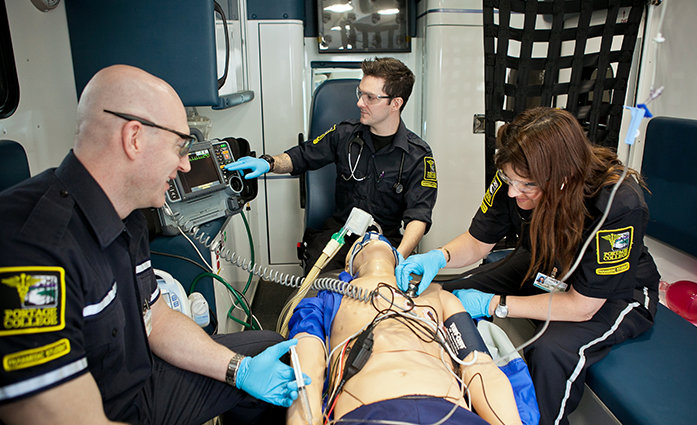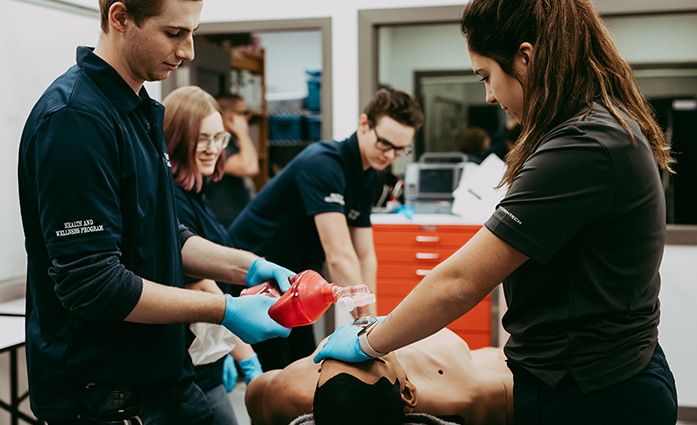Please click the link to view all of our international programs.
Apply For This Program
Get Started in a Career That You Are Passionate About. Click the link to apply today!
Emergency Medical Responders (EMRs) are integral to Emergency Medical Services and provide entry-level medical and trauma care in health services and industrial settings. They may be the first to arrive on the scene, be the only provider in remote areas, or work collaboratively in a team with other EMS/health care providers, first responders (i.e., Fire, Police), or community support agencies.
This program is not available to International Students. Our Designated Learning Institute (DLI) number is O111010246767.
Please Note: This program is not eligible for post-graduate work permit (PGWP).
The Portage College EMR full-time program is provided using a blended delivery model. This program combines online theory courses, onsite labs at the Lac La Biche campus and a clinical placement. This format allows students who are unable to relocate from their home community for the duration of their education program, the opportunity to pursue an Emergency Medical Responder certificate. By using the multi-modal approach to instruction, students can do the majority of theory instruction from home. For each 3-credit course, students can expect to spend an average of 6-10 hours studying per week.

Get Started in a Career That You Are Passionate About. Click the link to apply today!
Students who have completed the Emergency Medical Responder program can further their education by applying to the Primary Care Paramedic program.
If you would like to receive more information about this program please use the Info Request Form linked here.

In addition to the theory, labs and clinical placement, students must complete the Alberta Paramedicine Driver Operator Course (APDOC). The Alberta College of Paramedics has mandated this course as part of every Alberta EMR program and it is required for graduation. EMR Students will receive 40 hours of hands-on, behind-the-wheel ambulance training on our campus.
Students attend 5 onsite lab weeks throughout the 20-week program. During the mandatory on-site weeks, practical skills are assessed at the level of proficiency. Some written exams are scheduled during onsite weeks. Still, students may be required to arrange other exams supervised at any Portage College campus or by an approved invigilator when not on site. Students are responsible for all costs of exam invigilation external to Portage College.
Graduates are required to pass the Canadian Organization of Paramedic Regulators (COPR) Entry to Practice Examination to become registered and licensed to practice. This is a national examination at the EMR, PCP, and ACP levels. Upon completion, graduates can register with Alberta College of Paramedics.

Career Potential
Registered EMRs may be employed in ground ambulances, clinics, fire services and industrial settings.
Credentials
Certificate
Admission Requirements
Use this chart to check Provincial high school equivalencies accepted at Portage College. Note: This is just a guide.
Students who do not meet admission requirements can contact Student Services regarding opportunities for placement testing.
Required Documents:
Other:
Transferability: Transfer credits listed on the ACAT (Alberta Council on Admissions and Transfer) website will be approved for transfer credit to Portage College. Specific credit awards to a program are subject to the requirements and regulations of the admitting program and may vary from the total credit awarded by Portage College. To determine if this program transfers to other institutions, refer to the ACAT website.
Program Start/End Date
August 28, 2026 to January 23, 2027
Application Deadline
August 15, 2026
Location
Lac La Biche Campus
Delivery
Blended
Domestic Student Fees
Application Fee $53.50
Fall Term
Fee payment deadline: August 15, 2025
| Tuition | $3,613.08 |
| Student Association | $116.70 |
| Dental Insurance Fee | $163.25 |
| Health Insurance Fee | $163.25 |
| Technology Fee | $82.71 |
| Recreation Fee | $54.57 |
| Course Materials | $63.25 |
| Comptracker | $63.53 |
| ITLS | $168.30 |
| BLS | $3.85 |
| TDG | $24.15 |
| WHIMIS | $24.15 |
| Driving Course | $150.00 |
| PBA Training | $275.00 |
| Total | $4,965.79 |
Visit Portage Bookstore for textbooks and supplies
Tuition Deposit: $100 (non-refundable for oversubscribed programs)
Tuition is calculated using “cost-per-credit” one University credit is $170.00 and one Pre Health-Credit is 198.00. Calculate the cost by multiplying the number of credits per course, course dependent.
Need help funding your education? Check out our funding options.
Students’ Association Fees
These fees are authorized by student referendum and the Board of Governors. They are collected by the College on behalf of the Students’ Association in accordance with the Post Secondary Learning Act.
Health & Dental Fees
You may opt-out of the Dental and Health Insurance plan if you provide proof of comparable coverage for an extended health and/or dental care benefits plan.
Any questions regarding SA Fees including the Health and Dental Insurance fees should be directed to the SA Office 780-623-5609.
Athletics & Recreation Fees
These fees are collected to provide recreation and leisure opportunities that promote students’ physical, social, and emotional well-being, whether online or through in person facilities. Check out your +region in the link, to see what is offered at your campus or online.
Technology Fee
This is a mandatory fee assessed to students enrolling in any credit course (except for apprenticeship programs) at Portage College. The fee supports the on-going maintenance and upgrades to administrative systems that support the entire College infrastructure.
As such, it is considered a “mandatory non-instructional fee” and, therefore, is subject to Alberta Advanced Education Public Post-Secondary Institutions’ Tuition Fees Regulations. Visa students are charged the same rate as Canadian residents for this fee.